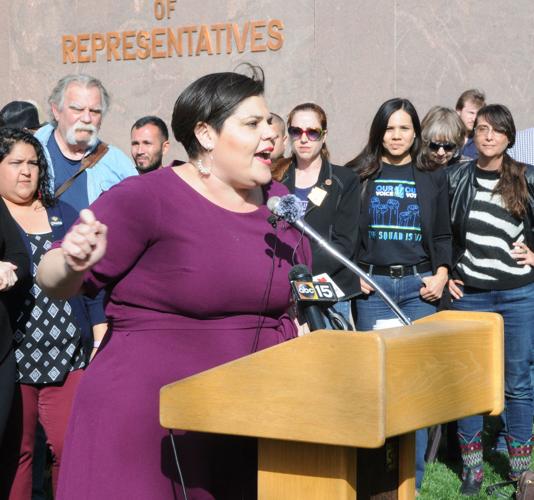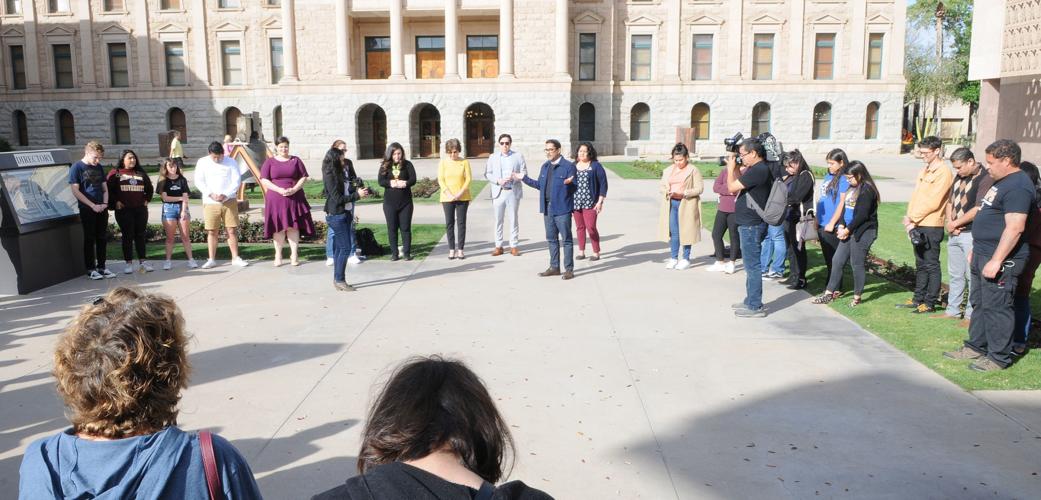PHOENIX — Hispanic activists and Democratic allies celebrated the death of a proposed constitutional ban on “sanctuary cities,” as Republican Gov. Doug Ducey sought to do damage control. A celebration rally Friday at the Capitol came several hours after the governor effectively conceded he was having trouble getting support for his proposal, which he had touted a month earlier at his State of the State address.
“With any policy, the stars need to align to get it done,” Daniel Scarpinato, the governor’s chief of staff, told Capitol Media Services. “And on this, we just came to the conclusion the stars weren’t aligning.”
In fact, some of Ducey’s strongest allies were telling him to pull the plug. “The business community had concerns,” Scarpinato said.
Those concerns were directly related to the fallout a decade ago after the Republican-controlled Legislature approved Senate Bill 1070, which started as one of the strictest state immigration laws in the nation. The law’s passage resulted in adverse national publicity and a sharp drop in the number of visitors and conventions in Arizona. Court challenges eventually softened many of SB 1070’s toughest provisions.
“Part of leadership is listening,” Scarpinato said Friday. “And the governor listened.”
Business groups expressed relief that Ducey is no longer asking lawmakers to refer the proposed constitutional ban to Arizona voters on the November ballot.
Greater Phoenix Leadership, for example, sent a message thanking the governor and Rep. T.J. Shope, R-Coolidge, who had agreed to sponsor the measure, for “putting Arizona first and no longer advancing the sanctuary city ban referral.”
And Glenn Hamer, president of the Arizona Chamber of Commerce and Industry, praised Ducey’s “prudent leadership,” which he said fits in with the governor’s desire for Arizona to have a “welcoming business environment and its excellent relationship with Mexico.”
At the same time, Scarpinato acknowledged that the constitutional ban probably wasn’t necessary.
He said there are provisions in SB 1070 that effectively mirror what Ducey wanted to take to the ballot. These involve barring local governments from refusing to share information or to collaborate with the federal government in determining whether someone is in this country illegally.
The only thing the proposal would have gained was to enshrine that wording in the Arizona Constitution, precluding any city from adopting such policies.
But as Scarpinato pointed out, voters in the one city to try that — Tucson —rejected it last fall by a 70-30 margin. The failed Tucson initiative would have put new restrictions on when police can inquire about immigration status or cooperate with federal law enforcement.
Democrats saw something more politically manipulative in Ducey’s proposal.
From the moment he introduced it last month, they said it was designed less to make a substantive change in Arizona law and more to put something on the November ballot to bring out the Republican base, to help reelect President Trump and to keep Martha McSally in the Senate seat Ducey appointed her to last year.
Scarpinato denied that was ever the goal.
“This was something that we felt was good policy,” designed to keep “bad California ideas” out of Arizona, he said. Some sanctuary cities have been declared in California.
The issue fired up Hispanic groups in a very visible way. Many showed up to testify against the Arizona proposal when it was heard more than a week ago in the Senate Judiciary Committee. That meeting devolved into a shouting match of sorts after Sen. Eddie Farnsworth, R-Gilbert, told Capitol police to remove a person who had called the measure racist. Farnsworth also cut off further testimony.
The raw feelings carried over earlier this week into a House committee hearing proposals on voting laws that some also argued were targeting Hispanics. There, too, Rep. Kelly Townsend, R-Mesa, cut off testimony and had people thrown out.
At the same time, groups like Living United for Change in Arizona (LUCHA) were working the phones, along with legislative Democrats, reaching out to business groups to pressure the governor to yank the plan.
Rep. Raquel Terán, D-Phoenix, said Friday the fate of Ducey’s plan is no mere accident.
She said it reflects the realization of the Hispanic community in the wake of SB 1070 that it needed to be more politically involved. What happened is just the latest victory for the energized community, Terán said.
In 2011, Senate President Russell Pearce, the Mesa Republican architect of SB 1070, was recalled.
Then, “In 2016 we ousted (Maricopa County Sheriff Joe) Arpaio who implemented the legislation that came out of the state Capitol,” turning out enough votes in the heavily Republican county to instead elect Democrat Paul Penzone.
That year LUCHA also led the successful ballot measure to increase the minimum wage from $8.05 an hour to $12 an hour now.
Then there was the defeat in 2018 of four Republican House members to cut the GOP edge to its current 31-29 margin.
“That’s a win for our community,” Terán said.
And 2018 was a good year overall for Democrats who, after years of holding no statewide office, managed to get their candidates elected to secretary of state, state schools chief and a seat on the Arizona Corporation Commission.
Standing in front of the Capitol Friday, Tomas Robles, co-executive director of LUCHA, said he thinks this will be the last time the Hispanic community must fight measures like this — if it’s the last year Republicans control both the Arizona House and Senate.





